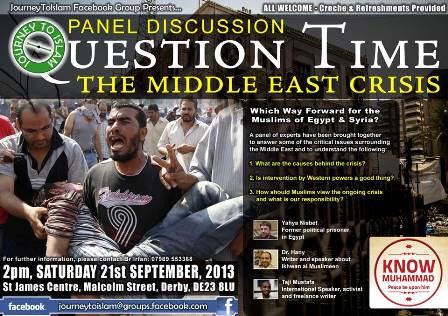
A Muslim audience in Derby, a small town in the middle of England, wanted to ask questions to a panel regarding the situation in Egypt and Syria; what is the stance of Hizb ut Tahrir regarding the Syria uprising? Is the idea of seeking nusrah realistic? What lessons can be learnt from the removal of Dr Morsi? Is democracy the way forward after the removal of Dr Morsi? Has political Islam failed in Egypt? So they invited me, Yahya Nisbet (a convert who had been unjustly jailed in Egypt during Mubarak’s time for belonging to a group calling for the Khilafah) and an Egyptian doctor from the Muslim Brotherhood.
I knew that such an audience would ask very pointed questions to us all including our brother from the Muslim Brotherhood and indeed one of the first questions to our brother from the Muslim Brotherhood was along the lines of whether there were failures and mistakes during the rule of Dr Morsi and what lessons could be learnt.
The doctor acknowledged that some mistakes had occurred but then also made points regarding the opposition Dr Morsi faced, the well planned nature of the coup and the fact that everything could not be made Islamic overnight. He argued for a gradualist approach as is the well known approach of our brothers in the Muslim Brotherhood citing the words of our Prophet صلى الله عليه وسلم regarding Hilf al-Fudl and other matters. This approach and evidences were not fundamentally new to me as we have encountered them over the years. Sensing the audience in Derby, I felt that there was a challenge for us. On one hand, how to get the audience to appreciate that some mistakes had been made by Dr Morsi’s government and for us all to learn from those as we go forward, whilst also ensuring that they are absolutely clear that the coup by Sisi could not be supported in any way and that the killing of Muslims who opposed his U.S. backed coup is a red line and haram from Shariah – no matter what one’s view is of the approach or mistakes made by Dr Morsi’s government. And all these points had to be made whilst recognising that many in the Muslim Brotherhood had sacrificed their lives and had been martyred in Raba Al-Adawwiyyah and Nasr City.
As the questions flowed, the three of us on the panel agreed on many points regarding Egypt and Syria but in terms of the way forward, we had a big disagreement on the continued call for ‘democracy’ in Egypt – by some of our brothers in the Muslim Brotherhood. Someone in the room questioned whether democracy could be a way to bring Islam. The brother from the Muslim Brotherhood mentioned that what was important is the meaning of things – that we should not get stuck on the terms. Brother Yahya said we should avoid the term ‘democracy’ as it is inaccurate and contradicts Islam and just further confuses people.
This got me thinking about what we have encountered in other countries when some Muslims use the word ‘democracy’. Some say democracy when what they mean is the right to have elections to choose the ruler as opposed to a ruler being imposed on them as happened with Mubarak, Gadaffi, Al-Saud and others. Others know that the true reality of ‘democracy’ is more than having elections to elect a ruler and includes having a body such as a parliament or senate that legislates laws by which society is run. Such legislation contradicts the Islamic Shariah in the sense that Allah سبحانه وتعالى is the Legislator and the Muslim ruler (Khaleefah) is meant to extract the appropriate ruling for different situations and apply them. So we ended up exploring what exactly was meant when people use the word ‘democracy’ with regards to Egypt and I explained that while I was opposed to Sisi’s coup, I was also opposed to calls for Dr Morsi to be brought back to preside over a ‘democratic’ system. Instead of calling for democracy, we should call for the Islamic Khilafah system, which says the Ummah should appoint her rulers. We, the Islamic activists from which ever group, now need to call for the Khilafah system, and explain it to the Ummah so they support it with awareness and conviction that this is what is mandated by Allah سبحانه وتعالى and this is the only system that can address the many problems people face in the Muslim world so that when this current coup fails, the Ummah can once again turn to that which she believes in and which is from Her Lord سبحانه وتعالى.
Whilst we on the panel had some points of disagreement, we had many points of agreement and this was one of the most fruitful debates I have ever had in dawah. Why? I believe that one of the main factors was that the panel and audience disagreed in an atmosphere of Islamic Brotherhood. The manners and etiquette of the doctor from the Muslim Brotherhood was extremely Islamic so though we argued and debated, you felt this was done sincerely, sensitively, in an open minded way and seeking the good for our Ummah in Syria and Egypt.
May Allah سبحانه وتعالى reward the organisers of the event, the doctor from the Muslim Brotherhood and my brother Yahya Nisbet and may we continue to have such frank interactions as a way to raise awareness about the Khilafah system.
Written for Central Media Office of Hizb ut Tahrir by
Taji Mustafa
Media Representative of Hizb ut Tahrir in Britain
